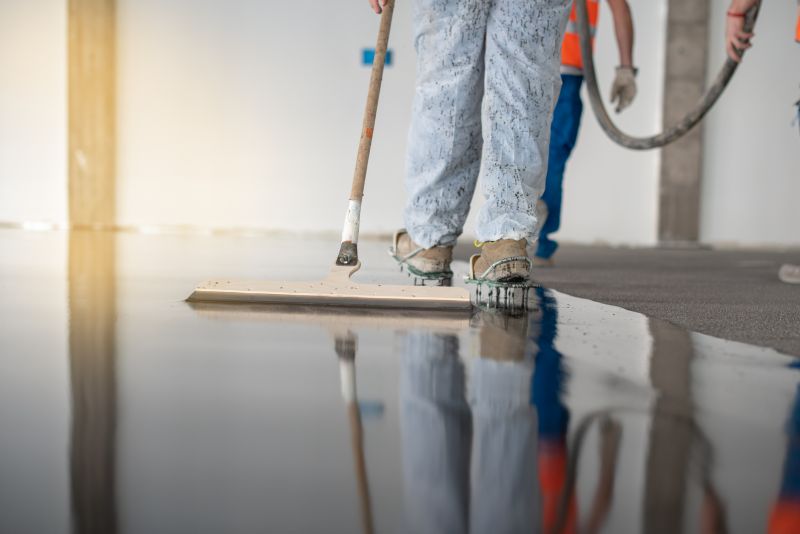Ultimate Product Guide For Concrete Floor Refinishings To Achieve Stunning Results
Learn about top products that deliver a professional finish and long-lasting durability for your concrete floors.
 Refinishing concrete floors is a practical way to enhance durability and aesthetic appeal in various indoor and outdoor spaces. The process typically involves preparing the existing surface, applying a suitable coating or overlay, and finishing with sealants or protective layers. Proper selection of products is essential to achieve a long-lasting and visually appealing result, whether restoring an old surface or creating a fresh look for a new installation.
Refinishing concrete floors is a practical way to enhance durability and aesthetic appeal in various indoor and outdoor spaces. The process typically involves preparing the existing surface, applying a suitable coating or overlay, and finishing with sealants or protective layers. Proper selection of products is essential to achieve a long-lasting and visually appealing result, whether restoring an old surface or creating a fresh look for a new installation.
Top Overall Option
Polymer-Based Concrete Coating System
A polymer-based coating system offers a versatile solution for concrete floor refinishing. It provides a durable, seamless surface that resists stains, abrasion, and chemicals, making it suitable for both residential and commercial applications. These systems often include primers, base coats, and topcoats, allowing for customization in finish and texture. Proper surface preparation and application techniques are essential to maximize performance and longevity.
Types of Products For Concrete Floor Refinishings
Epoxy Floor Coatings
Epoxy coatings are popular for their strong adhesion and chemical resistance, suitable for garages, basements, and industrial spaces.
Polyurethane Sealers
Polyurethane sealers provide a clear, durable finish that enhances appearance and protects against wear and moisture.
Acrylic Sealers
Acrylic sealers are easy to apply and offer a matte or gloss finish, ideal for decorative concrete surfaces.
Concrete Overlays
Overlays are thin layers of material applied over existing concrete to repair damage or create a new surface texture.
Self-Leveling Compounds
These compounds are used to smooth out uneven floors before applying decorative finishes or coatings.
Decorative Stains
Stains penetrate the concrete surface to produce variegated, natural-looking colors and patterns.
Polishing Pads and Kits
Polishing tools are used to achieve a glossy, smooth finish on concrete surfaces through mechanical grinding and polishing.
Concrete Dyes
Dyes provide vibrant, translucent color options for decorative concrete projects.
Crack Repair Products
Specialized fillers and patching compounds are used to repair surface cracks and prevent further damage.
Bonding Agents
Bonding agents improve adhesion between old concrete and new overlays or coatings.
Concrete Degreasers and Cleaners
These products are essential for preparing surfaces by removing oils, dirt, and contaminants before refinishing.
Anti-slip Additives
Additives improve traction on finished surfaces, enhancing safety in high-traffic or wet areas.
Vapor Barriers
Vapor barriers are used to prevent moisture transmission from the ground, protecting the finish.
Popular Choices
Epoxy coatings remain a widely used option for durable, chemical-resistant concrete finishes.
Polyurethane sealers are favored for their clear, protective finish and ease of maintenance.
Acrylic sealers are popular for their quick application and attractive appearance.
Overlays are chosen for their ability to cover surface imperfections and add decorative options.
These compounds are common for preparing uneven floors for further refinishing.
Stains are frequently used for creating unique, artistic effects on concrete surfaces.
Polishing equipment is often selected for achieving smooth, glossy concrete finishes.
Dyes are chosen for their vibrant color options and ability to customize concrete aesthetics.
Crack repair solutions are essential for maintaining the integrity of the concrete surface.
Bonding agents are often used to ensure proper adhesion of overlays and coatings.
Cleaning products are critical for preparing surfaces before refinishing work.
Different types of refinishing products serve specific purposes, from leveling uneven surfaces to adding decorative effects. It's important to understand the compatibility of these products with your concrete substrate, as well as their application requirements. Surface preparation, including cleaning and repairing cracks, plays a vital role in ensuring the success of the refinishing process.
Choosing the right products depends on factors such as the intended use of the space, load-bearing requirements, and desired aesthetic. Some products are designed for high-traffic areas, offering enhanced durability, while others focus on decorative finishes or ease of application. Properly applied, these products can significantly extend the lifespan of concrete floors and improve their appearance.
Whether you're undertaking a DIY project or hiring a professional, understanding the available options and their features can help you make informed decisions. From primers and sealers to overlays and decorative coatings, the variety of products allows for customization tailored to specific needs. Investing in quality materials and following manufacturer instructions can lead to more successful and satisfying refinishing outcomes.
Key Buying Considerations
- Surface compatibility: Ensure the product is suitable for the existing concrete type and condition.
- Intended use: Consider whether the surface will be high-traffic, decorative, or industrial.
- Durability requirements: Match product strength and resistance features to your needs.
- Application method: Check if the product is suitable for DIY application or requires professional skills.
- Application environment: Consider indoor versus outdoor use and exposure to moisture or chemicals.
- Finish appearance: Decide between matte, gloss, textured, or smooth finishes.
- Drying and curing times: Be aware of how long the product takes to set and cure before use.
- Compatibility with other products: Verify if multiple layers or products can be used together.
- Maintenance needs: Consider how the finished surface will be cleaned and maintained.
- Cost and coverage: Evaluate the cost per area and whether the product provides good value.
- Environmental conditions: Ensure proper ventilation and temperature conditions during application.
- Safety precautions: Review handling instructions and potential hazards.
- Brand reputation and reviews: Look for feedback on product performance and reliability.
- Availability of technical support: Check if manufacturer support is accessible for troubleshooting.
- Long-term performance: Consider reviews or data on how the product performs over time.
